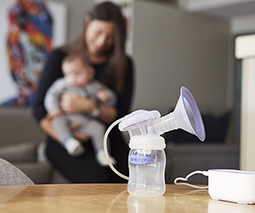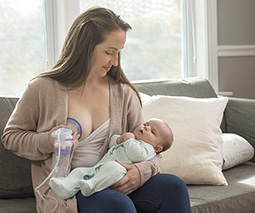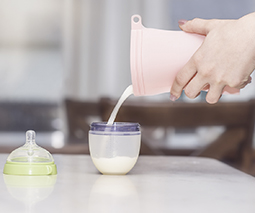Milk wars: ‘It’s time join forces instead of fighting about feeding babies’

I read a great article here on Babyology the other night. It was about the ‘formula for breastfeeding success’ – and how formula can sometimes get in the way of that for some women.
While it pointed out that formula isn’t always the right answer, it was clear that the writer’s agenda was not about poo-pooing families that use formula, but about providing some gentle education about what’s needed to get breastfeeding off the ground.
But like with any story that seems to pit formula against breastfeeding, many readers were quick to jump in and call outrage, that the article was insulting and didn’t take into account personal experiences etc etc.
I read the story again and realised that most of these commenters hadn’t even bothered to read it, they’d just waded in with their responses after reading the title.
Yes – breastfeeding can be traumatic
I get why women would be upset about stories that discredit their attempts at breastfeeding and the emotional trauma they experienced along the way. As a postpartum doula, I’ve met many women who have had a bad start with breastfeeding and never really got over it. It can be incredibly traumatic.
But the story was about how women can avoid breastfeeding struggles, and she was right on the money.
Yes, there are many cases of breastfeeding where formula ends up involved and the results are good: baby ends up thriving and mum is coping emotionally. Of course this is of paramount importance. But let’s not forget that there are also plenty of times when formula is used erroneously during the early weeks, and the introduction of this derails breastfeeding completely. This happens way too often, and it comes down to not having the right information at hand.
Read more about breastfeeding struggles here:
- 8 common breastfeeding struggles new mums need to know about
- Weaned too early? How one mum’s story is proof that you can start over
- I struggled to breastfeed my first baby – here’s what I plan to do differently
There’s not enough information for new mums
Too many women start out with breastfeeding not knowing how important it is to spend the first six weeks building up milk supply and how critical this time can be. Remember, ‘supply’ equals ‘demand’. If formula is used during these early weeks, and its use isn’t guided by a health professional, your body can end up receiving too few signals to make breast milk and you won’t have enough to feed your baby – which can be very upsetting to experience.
This isn’t your fault, and no one is saying you’re a bad mother for bringing formula into the equation. Clearly, there needs to be more information provided to new mums so they don’t fall into the supplementing trap. And this is what the story was about – providing evidenced-based information to new mums so they can get closer to breastfeeding success.
Isn’t that what we want for these new mums, despite any bad experiences we had?
Although you might have had a traumatic experience with breastfeeding, surely you agree that to prevent other women going through what you have, they need to get the right information and support – which maybe you didn’t get.
This isn’t a war ladies
It’s time everyone put down their guns and stopped reacting every time a breastfeeding story like this pops up. If you had a bad experience with breastfeeding that still stirs up big feelings for you, maybe you need to get some help. I’m serious – if your feeding experience was traumatic (and it often is for women), then please consider talking to someone about it. That’s what people do to get past trauma.
Posting indignant and angry comments on Facebook isn’t going to help, nor is referring to breastfeeding supporters as the ‘breastfeeding brigade’ or, my personal favourite, ‘breastfeeding nazis’. (Incidentally, what a rotten thing to say about a group of people dedicated to spreading the word about the benefits of breastfeeding and how to get help if you need it.)
I get that some ladies have experienced breastfeeding support that comes across heavy handed and lacking bedside manner – and I’m sorry for this. However, this is the same with all health professionals: you get brilliant ones and others … not so much. Please don’t tar all breastfeeding professionals with the same brush – it’s just not helpful.
We need to come together – for future mums
Like the story mentioned, most women start out wanting to breastfeed – but for many reasons they don’t get past the first three months. I think part of the problem is going into breastfeeding unaware of what lies ahead. Additionally, negative stories they’ve heard or read about can set them up with the wrong mindset.
As fellow mums, I’m sure you agree that if mums-to-be go into motherhood prepared for breastfeeding, then they might side-step the awful experiences some of you have had. I’m sure deep down, that’s what we want for future mum generations. Right?
If we could just join forces instead of fighting about feeding our babies, maybe we could help a lot of other women that need it. We are all in this together, after all.









